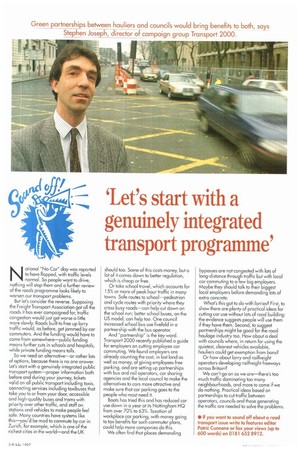'Let's start with a genuinely integrated transport programme'
Page 47

If you've noticed an error in this article please click here to report it so we can fix it.
National "No-Car" day was reported to have flopped, with traffic levels normal. So people want to drive, nothing will stop them and a further review of the roads programme looks likely to worsen our transport problems.
But let's consider the reverse. Supposing the Freight Transport Association got all the roads it has ever campaigned for, traffic congestion would just get worse a little more slowly. Roads built to free up lorry traffic would, as before, get jammed by car commuters. And the funding would have to come from somewhere—public funding means further cuts in schools and hospitals, while private funding means tolls. So we need an alternative—or rather lots of options, because there is no one answer. Let's start with a genuinely integrated public transport system—proper information both before and during your journey, tickets valid on all public transport including taxis, connecting services including taxibuses that take you to or from your door, accessible and high-quality buses and trams with priority over other traffic, and staff on stations and vehicles to make people feel safe. Many countries have systems like this—you'd be mad to commute by car in Zurich.. for example, which is one of the richest cities in the world—and the UK should too. Some of this costs money, but a lot of it comes down to better regulation, which is cheap or free. Or take school travel, which accounts for 15% or more of peak hour traffic in many towns. Safe routes to school—pedestrian and cycle routes with priority where they cross busy roads—can help cut down on the school run; better school buses, on the US model, can help too. One council increased school bus use fivefold in a partnership with the bus operator. And "partnership" is the key word. Transport 2000 recently published a guide for employers on cutting employee car commuting. We found employers are already counting the cost, in lost land as well as money, of giving employees free parking, and are setting up partnerships with bus and rail operators, car sharing agencies and the local council to make the alternatives to cars more attractive and make sure that car parking goes to the people who most need it. Boots has tried this and has reduced car use down in a year at its Nottingham HQ from over 70% to 63%. Taxation of workplace car parking, with money going to tax benefits for such commuter plans, could help more companies do this. We often find that places demanding
bypasses are not congested with lots of long-distance through traffic but with local car commuting to a-few big employers. Maybe they should talk to their biggest local employers before demanding lots of extra concrete.
What's this got to do with lorries? First, to show there are plenty of practical ideas for cutting car use without lots of road building: the evidence suggests people will use them if they have them. Second, to suggest partnerships might be good for the road haulage industry too. How about a deal with councils where, in return for using the quietest, cleanest vehicles available, hauliers could get exemption from bans? Or how about lorry and roilfreight operators developing railfreight freeways across Britain?
We can't go on as we are—there's too much traffic dominating too many neighbourhoods, and more to come if we do nothing. Practical ideas based on partnerships to cut traffic between operators, councils and those generating the traffic are needed to solve the problems.
• If you want to sound off about a road transport issue write to features editor Patric Cunnane or fax your views (up to 600 words) on 0181 652 8912.








































































































